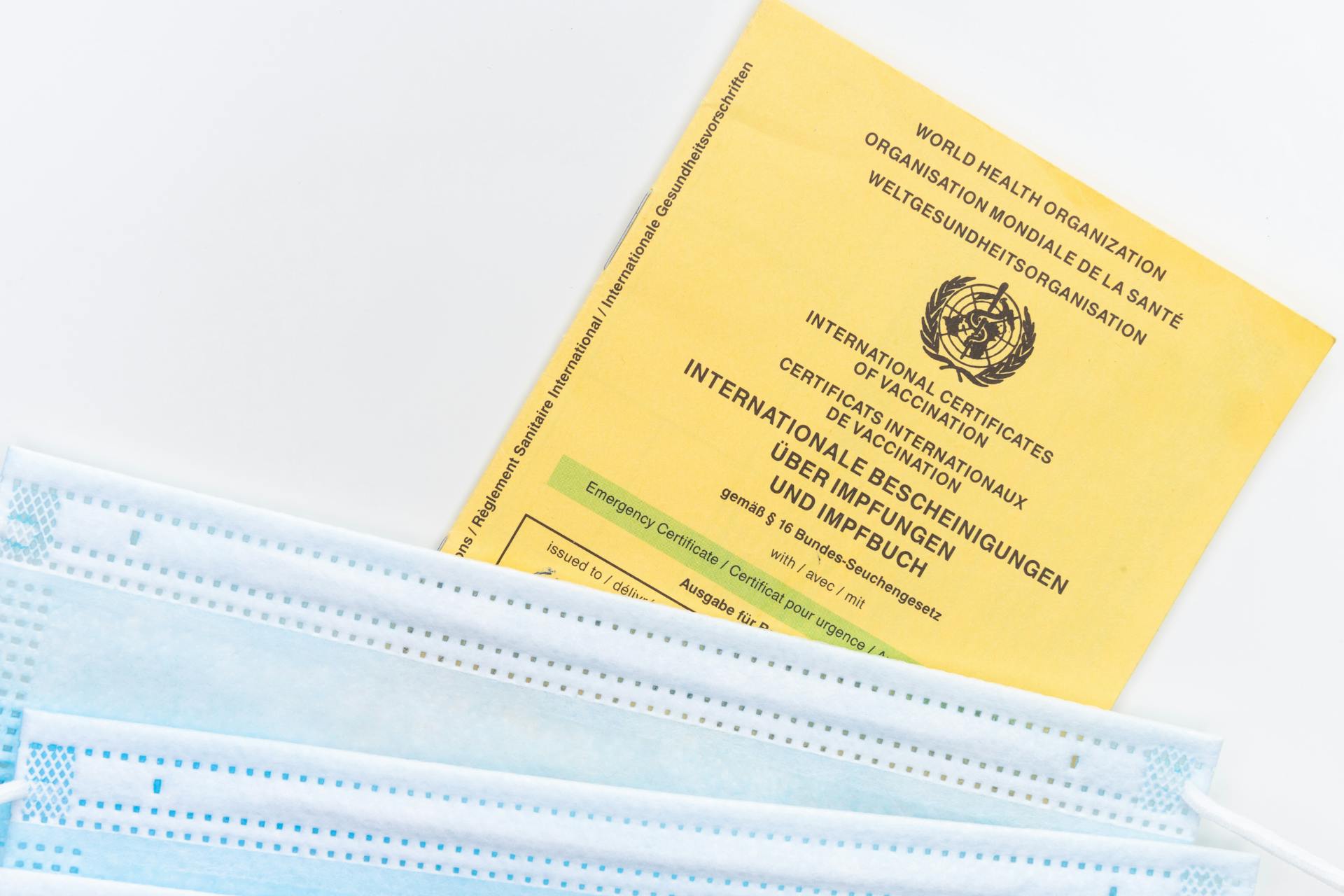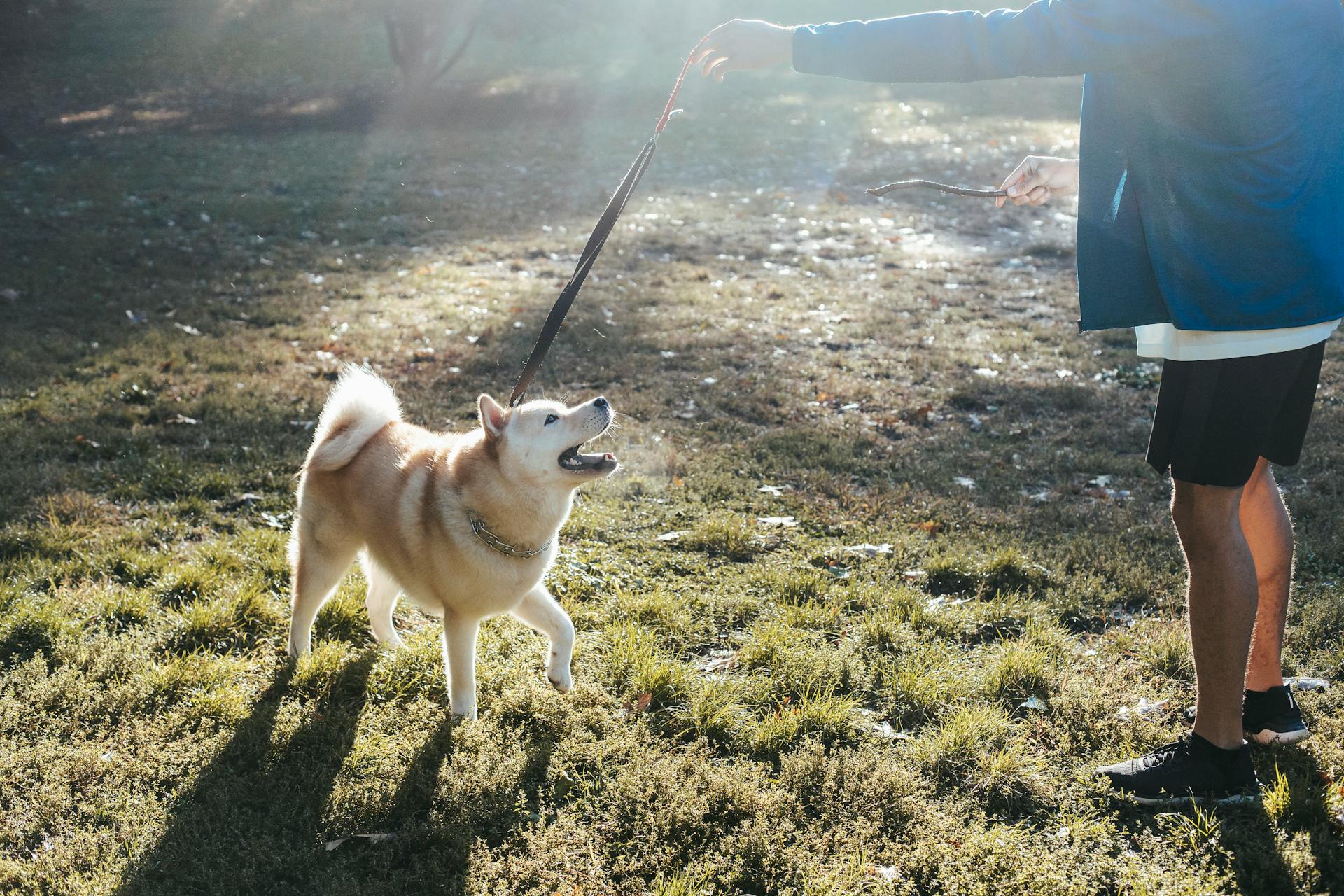
Getting a health certificate for your dog is a relatively straightforward process, but it can be overwhelming if you're not familiar with the requirements.
The first step is to determine which type of health certificate you need. This depends on the purpose of travel, with international travel requiring a more comprehensive certificate.
You'll need to choose a licensed veterinarian to perform the examination and issue the certificate, which must be done within 10 days of travel.
The examination itself is a routine process, where the vet will check your dog's overall health, vaccination status, and ensure they meet the import or export requirements of the destination country.
Here's an interesting read: Does My Dog Need a Health Certificate to Enter Canada
Understanding Requirements
Each state in the U.S. has its own set of regulations for pets traveling across state lines, so it's essential to check the specific requirements of your destination state.
In addition to local, federal, and state requirements, airlines and other modes of transportation services have their own set of regulations and requirements that your pet must meet prior to travel.
A health certificate is documented proof stating that your pet meets all of the requirements expected by the destination to which you are traveling, and it must be completed by a USDA-accredited Veterinarian.
Most states require a rabies vaccination at least 30 days before travel, and many countries require at least a rabies vaccine and possibly rabies titer testing within a specified time frame prior to travel.
Be sure to research and plan ahead to ensure a smooth journey for your furry friend, and check your transportation service's vaccination and other travel requirements.
Domestic vs International Pet Certificate
A domestic pet health certificate is required for traveling within the country, and it's valid for a longer period than an international certificate.
Most locations require a health examination and up-to-date vaccines, a microchip, parasite control, and disease testing for domestic pet health certificates.
International travel calls for different certificates and requirements than domestic health certificates.
Discover more: International Health Certificate Dog
An International Pet Health Certificate is required when traveling internationally with your pet, and it's valid for 10 days if you travel by plane with your pet and 30 days if traveling by land.
It's essential to note that international travel can be very complex and can take several months of planning to allow time for laboratory testing and to ensure your pet meets all necessary requirements for not only the country but for the transportation services as well.
Certificate Process
Obtaining a pet health certificate can be a bit complicated, as each state and country has different rules. It can take up to six months to receive the certificate.
Most states require a registered, accredited veterinarian to examine your dog, and certain vaccinations, like the rabies vaccination, must be up to date for travel. Your vet might also check for heartworm during the exam.
To obtain a pet health certificate, you can ask your veterinarian how to get started with digital animal health records through GlobalVetLink.
Physical Examination
A physical examination is a crucial part of the health certificate process. It's a thorough check-up that assesses your pet's overall health and condition.
A veterinarian will typically check your pet's body weight, coat condition, and skin. They'll also examine their eyes, ears, nose, teeth, mobility, heartbeat, and lung sounds.
A physical exam is required for the health certificate, but it's also a valuable service that gives vets insight into what's going on with your furry friend. These exams often help vets catch issues with pets early on so the condition can be treated before it becomes serious.
Here are the key areas that a veterinarian will check during a physical examination:
- Body weight
- Coat condition & skin
- Eyes
- Ears
- Nose
- Teeth
- Mobility
- Heartbeat
- Lung sounds
Certificate Process
To obtain a pet travel certificate, you'll need to have your pet examined by a registered, accredited veterinarian. This can take up to six months, so plan ahead.
First, ensure your pet is up to date on all vaccinations, including the rabies vaccination, which must be at least 30 days before travel. You can check with your veterinarian or the PetWellClinic to find out what vaccinations are required for your destination.

Your veterinarian will review your pet's vaccination records and may administer necessary vaccinations. They'll also conduct a physical examination, review parasite control, and perform a disease screening, which may include blood tests or fecal examinations.
To make the process smoother, it's essential to have your pet's most current vaccination records, including a rabies certificate, and be cleared for parasites. This will help ensure your pet is disease-free and up to date on all vaccinations.
Here's a quick checklist to keep in mind:
- Ensure your pet is up to date on all vaccinations, including rabies
- Have your pet examined by a registered, accredited veterinarian
- Review your pet's vaccination records and obtain necessary vaccinations
- Have your pet cleared for parasites and disease-free
- Obtain a certificate of veterinary assessment and any additional required certificates, such as an acclimation certificate
Remember, it's always better to be safe than sorry when it comes to your pet's health and travel requirements.
Certificate Validity Period
A health certificate is valid for 30 days after the date of issue, unless there's a disease outbreak, in which case it may need to be re-issued sooner.
If you're traveling internationally with your pet, the certificate is only valid for short periods of time, lasting 10 days if you travel by plane and 30 days if traveling by land.

You'll need to plan ahead for your pet's return home, as the certificate will need to be recertified and meet the requirements for re-entry to your home country and state.
In most cases, a CVI is valid for 30 days after the date of issue, so be sure to check the expiration date carefully.
On a similar theme: Adorable Home
Easy Certificates
Obtaining a pet health certificate can be a lengthy process, taking up to six months in some cases.
To make the process easier, you can use GlobalVetLink, a software that creates complete health certificates seamlessly and without error.
GlobalVetLink's health certificates are approved for all US states and territories, and they allow auto-fill client and animal information.
They also feature built-in state movement requirements and enable immediate submission to state officials.
A federally accredited veterinarian must sign these certificates, which can be easily shared with clients online.
Here are the key features of GlobalVetLink's health certificates:
- Approved for all US states and territories
- Auto-fill client and animal information
- Built-in state movement requirements
- Immediate submission to state officials
- Secure alternative to 7001 forms
- Easily shared with clients online
To obtain a pet health certificate, you'll need to work with your veterinarian, who can help you get started with digital animal health records through GlobalVetLink.
Frequently Asked Questions
Can my dog fly without a health certificate?
No, a health certificate is not required for dogs to enter California by air, but it's recommended to check with the airline for additional requirements. However, a health certificate may still be necessary for other reasons, such as international travel or specific airline policies.
How long does it take to get a health certificate from the USDA?
USDA health certificate endorsement typically takes 3 business days or less, assuming accurate and complete information is provided. Incomplete or incorrect submissions may delay the process until corrections are made
Sources
- https://www.petwellclinic.com/wp/2023/08/15/how-to-get-veterinary-health-certificate-pet-travel/
- https://heartofchelsea.com/blog/what-are-pet-travel-certificates/
- https://www.colonialparkanimalclinic.com/site/health-certificates-travel
- https://www.gopetvet.com/health-certificate
- https://www.globalvetlink.com/compliance/health-certificates/
Featured Images: pexels.com

